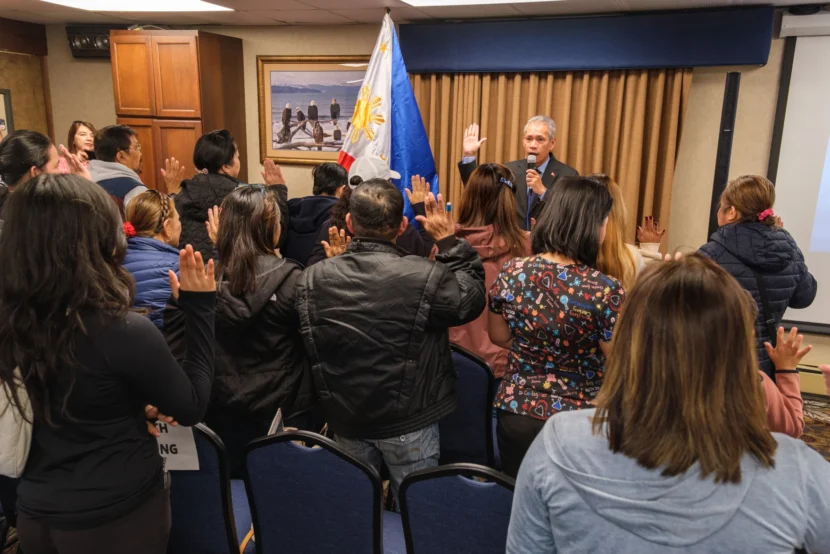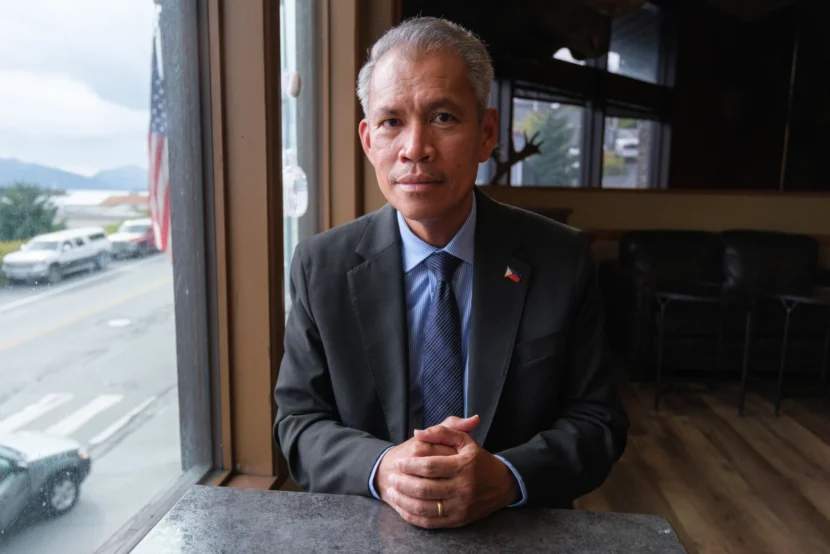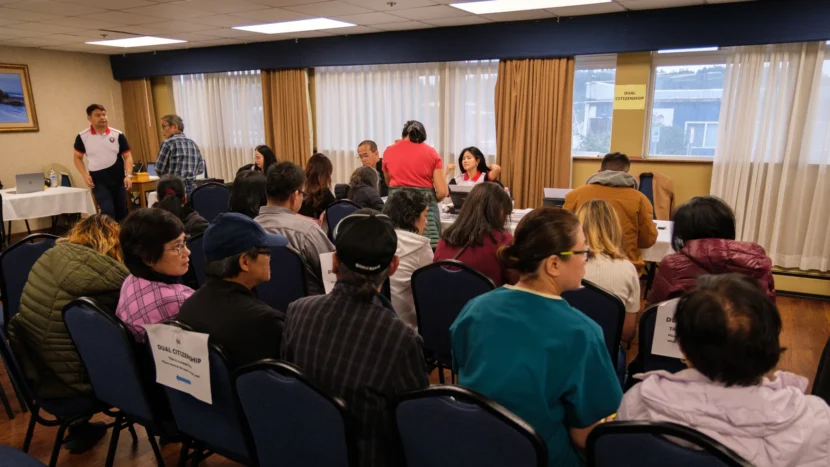
The Philippine National Anthem, “Lupang Hinirang,” played for newly sworn in citizens at Kodiak’s Best Western Hotel this week. The hotel’s Harbor Room was packed with people looking to meet with the Southeast Asian country’s visiting consulate.
Daisy Briones is one of them. She lives in Kodiak and works at one of the schools and the library. She’s both a volunteer for, and a beneficiary of the consular outreach to Kodiak.
“This is much better, much faster, and more convenient – and you know everybody,” she said.
For the first time since before the pandemic, a Philippine diplomat visited Kodiak on Sept. 24. The consular team provided services that people would otherwise have to leave the island, or the state, to receive.
The Philippine consulate works as a sort of extension of the country’s embassy in Washington D.C. and serves people outside the Philippines.
Immigration can be complex, but the gist for many is that when some Philippine nationals become U.S. citizens, they end up renouncing their home country’s citizenship. But, they can regain legal ties as dual citizens later. That’s what Briones did.
If she wanted to go through the same process without the outreach to Alaska, she would have had to fly to the nearest consular office, which is in San Francisco.
The swearing in ceremony for dual citizenship lasts about 15 minutes, concluding with an oath in Filipino, the official language of the Philippines, which is largely based on Tagalog.
The Kodiak visit is important, in part because the borough has the second most people with Filipino heritage in the state, according to census data. Kodiak has about 3,253 Filipinos, while Anchorage has an estimated 18,033.
Philippine Consulate General Neil Frank Rivera Ferrer said he tries to serve Alaska at least once a year. Teams mostly have gone to cities like Anchorage and Juneau in recent years, but this is the first time anyone can remember consular outreach to Kodiak in nearly a decade.
“Since I assumed my post in 2021, I made it a priority to service our Kababayans in Alaska,” Ferrer said.
Kababayan roughly translates to countrymen in Filipino.

Ferrer, his consulate staff, and volunteers helped 296 people file paperwork with the Philippine government during their day in Kodiak for a variety of administrative services. He said he’s glad to help people who might not be able to get these services otherwise. All they have to do is bring paperwork that shows previous Philippine citizenship.
While some people regained their citizenship, others registered for overseas voting and renewed their passports – or did all three – in a single day.
“It saves them a lot of money in terms of the cost for traveling, and also the time,” he said. “You’d have to take time off from work – one or two days just to travel and those things. So we try to do that as much as we can.”
A flight to San Francisco can cost over $1,000 – not including money for taxis or hotels.
Ferrer’s office is just one of eight in the U.S. including the embassy in Washington D.C. The others are in Chicago, Los Angeles, Honolulu, New York, Houston and Guam.
Ferrer serves Northern California, Northern Nevada, Colorado, Idaho, Montana, Oregon, Utah, Washington State, and Wyoming in addition to Alaska. The combined population he serves is around 1.3 million Filipino people.

Alaska’s honorary consul, Rebecca Carrillo, was also part of the visit. She can’t provide these services herself, but works as a sort of intermediary between Philippine nationals in Alaska and the consular offices in the Lower 48 and Hawaii. She said she loves meeting people and hearing their immigration stories.
“Their journey from the Philippines to here has transformed their lives, their families’ lives, (for) how many generations,” she said.
Carrillo said she’s heard that many Filipino people have faced discrimination, but retained their identity and love for their homeland despite that. Many of whom did so while building their lives here.
“They are thriving – they own their own homes, they’re able to send their kids to college,” Carillo said. “Those kids are doing well, and it’s the proverbial realization of the American Dream.”
And now many folks who’ve realized that dream want to go back to the Philippines. U.S. citizens can usually only stay in the Philippines for about a month depending on their visa, but dual citizenship allows them to stay longer, or even move back. With a Philippine passport, they can also have a faster process when going through customs and immigration.
Briones, the volunteer, still has siblings there. She said the consular team helped make the process to visit them easier for her.
“The consular team, they’re so accommodating,” she said. “We have plenty of senior citizens here who are applying for their dual (citizenship) or (a) passport. There’s a patience in helping out all these people and we truly appreciate all their efforts.”
The San Francisco consulate office plans to draft its schedule for the next Alaska outreach by the end of the year.
